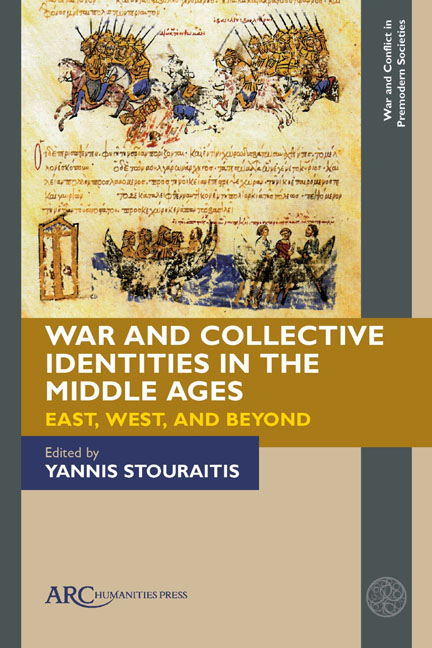Book contents
- Frontmatter
- Contents
- Notes on Contributors
- Chapter 1 War and Peoplehood in the Middle Ages: An Introduction
- Chapter 2 War and Peoplehood through Time: A Sociological Longue Durée Perspective
- Chapter 3 Making War Ethnic: Arab– Persian Identities and Conflict on the Euphrates Frontier
- Chapter 4 Captive Identities: Inscribing Armenianness from Sebēos to Ayrivanec‘i
- Chapter 5 War and Identity in Early Medieval Bulgaria
- Chapter 6 Collective Identifications in Byzantine Civil Wars
- Chapter 7 Warfare and Peoplehood: The Vikings and the English
- Chapter 8 Medieval European Civil Wars: Local and Proto-national Identities of Toulousains, Parisians, and Prague Czechs
- Chapter 9 The Crusades and French Political Identity in the Thirteenth-Century Mediterranean
- Chapter 10 The Song– Jurchen Conflict in Chinese Intellectual History
- Chapter 11 Faithful to a Vanishing Past: Narrating Warfare and Peoplehood in Yuan China
- Chapter 12 War and Collective Identifications in Medieval Societies: Drawing Comparisons
- Selected Bibliography
- Index
Chapter 3 - Making War Ethnic: Arab– Persian Identities and Conflict on the Euphrates Frontier
Published online by Cambridge University Press: 28 December 2023
- Frontmatter
- Contents
- Notes on Contributors
- Chapter 1 War and Peoplehood in the Middle Ages: An Introduction
- Chapter 2 War and Peoplehood through Time: A Sociological Longue Durée Perspective
- Chapter 3 Making War Ethnic: Arab– Persian Identities and Conflict on the Euphrates Frontier
- Chapter 4 Captive Identities: Inscribing Armenianness from Sebēos to Ayrivanec‘i
- Chapter 5 War and Identity in Early Medieval Bulgaria
- Chapter 6 Collective Identifications in Byzantine Civil Wars
- Chapter 7 Warfare and Peoplehood: The Vikings and the English
- Chapter 8 Medieval European Civil Wars: Local and Proto-national Identities of Toulousains, Parisians, and Prague Czechs
- Chapter 9 The Crusades and French Political Identity in the Thirteenth-Century Mediterranean
- Chapter 10 The Song– Jurchen Conflict in Chinese Intellectual History
- Chapter 11 Faithful to a Vanishing Past: Narrating Warfare and Peoplehood in Yuan China
- Chapter 12 War and Collective Identifications in Medieval Societies: Drawing Comparisons
- Selected Bibliography
- Index
Summary
BATTLES AND ETHNIC identities seem natural companions in theory. Both engage strong emotions, both are conceptualized in binary oppositional terms of “us” versus “them,” and via memories of battles, ethnic groups can plot their history in heroic terms explaining how “we” as a people emerged from the crucible of conflict, how strong “we” are, and how “we” have always fought “them.” But the well-known vicissitudes of collective memory readily recraft past events to harmonize them with a community's present circumstances. In practice, therefore, battles may not always be as ethnically charged in the thick of the fight as they come to be memorialized afterwards. This chapter studies the memorialization of the Battle of Dhū Qār, a pre-Islamic clash on Iraq's Euphrates frontier ca. 610 CE, which acquired a prominent and evolving significance in Muslim historiography.
Dhū Qār presents itself as a natural case study for war and peoplehood since its story has been told in explicitly ethnic terms for over 1,000 years. Arabic literature from at least the third/ninth century regularly references Dhū Qār as the “the Arabs’ first victory over the Persians,” or “the first time the Arabs showed themselves equal to the Persians,” and the pre-Islamic battle is depicted as foreshadowing the imminence of the Muslim conquest of Iraq which extinguished the Sasanian Empire just a few decades later. Muslim-era histories invoke an ethnic binary of “Arab” versus “Persian” to project Dhū Qār as a crucial turning point in world history: under this worldview, Persian kings had dominated the Middle East for centuries before Muhammad, but Muhammad's Arab people were to end Persian supremacy once and for all via the Muslim Conquests. Hence Dhū Qār was the “beginning of the end,” the turning of the tide, the moment when the Arabs first displayed their potential. According to these Muslim-era narratives, once the Arabs embraced Islam shortly after Dhū Qār, they could commence their irresistible conquest of the Middle East.
The Arab– Persian divide is salient in Middle Eastern social history, and competition between partisans of both identities has persisted in varying degrees since early Islam to the present with Dhū Qār as the pivot point of the rhetoric.
- Type
- Chapter
- Information
- War and Collective Identities in the Middle AgesEast, West, and Beyond, pp. 33 - 64Publisher: Amsterdam University PressPrint publication year: 2023



